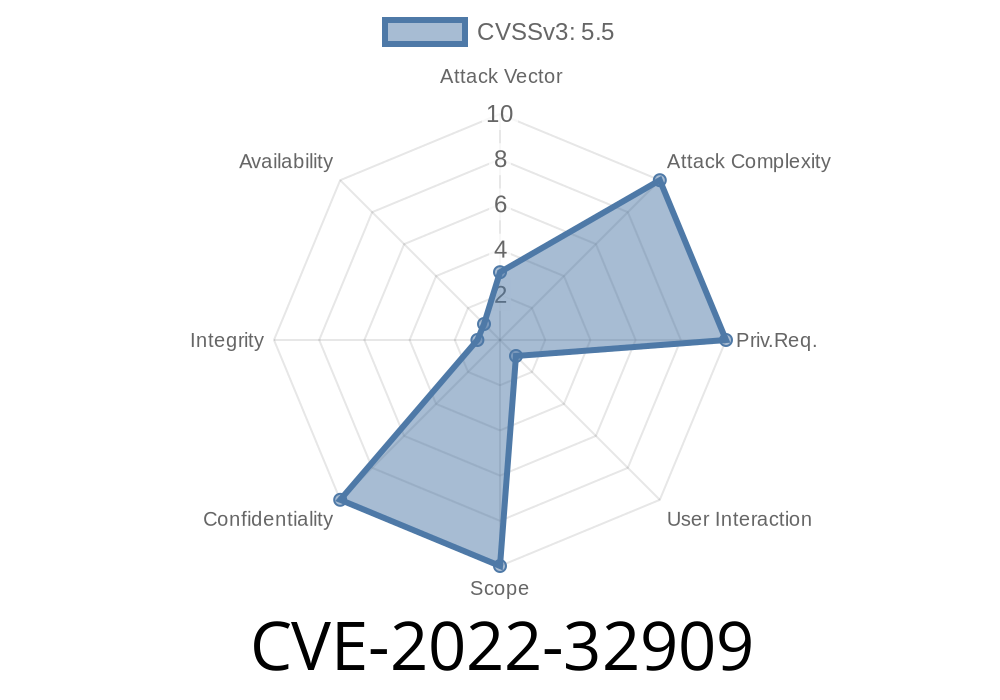In 2022, Apple fixed a critical security problem in iOS that could let malicious apps snoop on user data. Tagged as CVE-2022-32909, this vulnerability brought attention to the sometimes-overlooked importance of cache management in operating systems. In this article, I’ll break down the bug in simple terms, walk you through how it could be exploited, and show you what Apple did to fix it in iOS 16.
What Is CVE-2022-32909?
CVE-2022-32909 was classified as an improper cache handling issue. In basic terms, when an app runs on your iPhone or iPad, iOS keeps some data in fast storage (“cache”) for speed. If the system fails to clear out sensitive bits of data after an app finishes using them, a different app might access what’s left behind.
Apple’s official description:
> “The issue was addressed with improved handling of caches. This issue is fixed in iOS 16. An app may be able to access user-sensitive data.”
(Source: Apple Security Updates)
Why Is This a Big Deal?
Let’s say one app, like a banking app, handles very private info. If caches aren’t wiped clean, another app (possibly a malicious one disguised as a game or utility) could peek into the leftover data, potentially grabbing things like session tokens, fragments of email, or even passwords.
In the wrong hands, this information could be used for identity theft, fraud, or spying.
Example Pseudocode (for illustration only)
Here’s a conceptual example in Swift-like pseudocode. This shows how a second app might read leftover data from the cache if the system didn’t properly clear it (discussion only; no real exploit code):
// MaliciousApp.swift
import Foundation
// Try to access shared system cache
let cachePointer = UnsafeMutablePointer<UInt8>.allocate(capacity: cacheSize)
readCacheData(into: cachePointer, size: cacheSize)
// Look for specific patterns or sensitive info
let sensitiveData = scanForKeywords(in: cachePointer, keywords: ["password", "token", "email"])
if !sensitiveData.isEmpty {
print("Sensitive info found: \(sensitiveData)")
}
*Note*: On an actual, well-secured iOS system, sandboxing and security checks should block this. The vulnerability existed because, under certain conditions, these protections could be bypassed due to improper cache cleanup.
The victim uses a sensitive app (like a banking or private email app).
3. The malicious app requests memory or triggers code paths that grant access to previously used cache memory.
Sensitive data is uploaded to the attacker.
This attack would be risky for the attacker, but possible in environments where sandbox boundaries were degraded by the cache handling bug.
How Apple Fixed It
In iOS 16, Apple overhauled the way apps handle cached content. Specifically, they made sure that sensitive cache data is securely erased or isolated once an app is finished accessing it.
From the Apple security notes
> “The issue was addressed with improved handling of caches.”
References
- Apple CVE-2022-32909 Security Note
- NIST NVD CVE-2022-32909 Entry
- iOS Security Guide (Apple)
Final Thoughts
CVE-2022-32909 is a great reminder that even small security oversights, like mishandling cache memory, can have big impacts. Thanks to Apple’s quick patch, iOS devices are safer now—but it always pays to keep your device updated and be mindful of what you install.
Timeline
Published on: 11/01/2022 20:15:00 UTC
Last modified on: 11/02/2022 18:17:00 UTC
